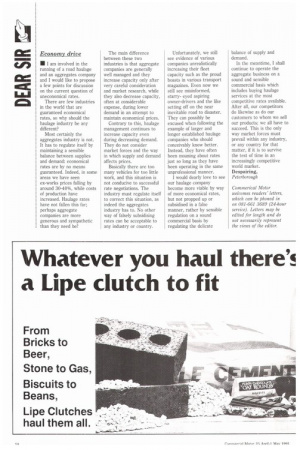• I am involved in the running of a road
Page 60

If you've noticed an error in this article please click here to report it so we can fix it.
haulage and an aggregates company and I would like to propose a few points for discussion on the current question of uneconomical rates.
There are few industries in the world that are guaranteed economical rates, so why should the haulage industry be any different?
Most certainly the aggregates industry is not. It has to regulate itself by maintaining a sensible balance between supplies and demand: economical rates are by no means guaranteed. Indeed, in some areas we have seen ex-works prices falling by around 30-40%, while costs of production have increased. Haulage rates have not fallen this far; perhaps aggregate companies are more generous and sympathetic than they need be? The main difference between these two industries is that aggregate companies are generally well managed and they increase capacity only after very careful consideration and market research, while they also decrease capacity, often at considerable expense, during lower demand in an attempt to maintain economical prices.
Contrary to this, haulage management continues to increase capacity even during decreasing demand. They do not consider market forces and the way in which supply and demand affects prices.
Basically there are too many vehicles for too little work, and this situation is not conducive to successful rate negotiations. The industry must regulate itself to correct this situation, as indeed the aggregates industry has to. No other way of falsely subsidising rates can be acceptable to any industry or country. Unfortunately, we still see evidence of various companies unrealistically increasing their fleet capacity such as the proud boasts in various transport magazines. Even now we still see misinformed, starryeyed aspiring owner-drivers and the like setting off on the near inevitable road to disaster. They can possibly be excused when following the example of larger and longer established haulage companies who should conceivably know better. Instead, they have often been moaning about rates just so long as they have been operating in the same unprofessional manner.
I would dearly love to see our haulage company become more viable by way of more economical rates, but not propped up or subsidised in a false manner, rather by sensible regulation on a sound commercial basis by regulating the delicate balance of supply and demand.
In the meantime, I shall continue to operate the aggregate business on a sound and sensible commercial basis which includes buying haulage services at the most competitive rates available. After all, our competitors do likewise as do our customers to whom we sell our products; we all have to succeed. This is the only way market forces must prevail within any industry, or any country for that matter, if it is to survive the test of time in an increasingly competitive world market.
Despairing, Peterborough
























































































































